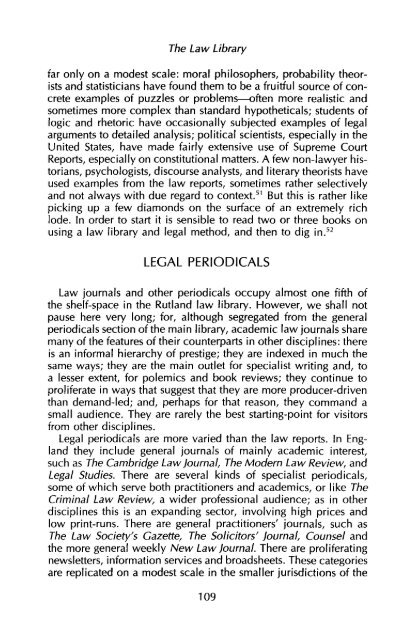Blackstone's Tower: The English Law School - College of Social ...
Blackstone's Tower: The English Law School - College of Social ...
Blackstone's Tower: The English Law School - College of Social ...
You also want an ePaper? Increase the reach of your titles
YUMPU automatically turns print PDFs into web optimized ePapers that Google loves.
<strong>The</strong> <strong>Law</strong> Library<br />
far only on a modest scale: moral philosophers, probability theorists<br />
and statisticians have found them to be a fruitful source <strong>of</strong> concrete<br />
examples <strong>of</strong> puzzles or problems—<strong>of</strong>ten more realistic and<br />
sometimes more complex than standard hypotheticals; students <strong>of</strong><br />
logic and rhetoric have occasionally subjected examples <strong>of</strong> legal<br />
arguments to detailed analysis; political scientists, especially in the<br />
United States, have made fairly extensive use <strong>of</strong> Supreme Court<br />
Reports, especially on constitutional matters. A few non-lawyer historians,<br />
psychologists, discourse analysts, and literary theorists have<br />
used examples from the law reports, sometimes rather selectively<br />
and not always with due regard to context. 51 But this is rather like<br />
picking up a few diamonds on the surface <strong>of</strong> an extremely rich<br />
lode. In order to start it is sensible to read two or three books on<br />
using a law library and legal method, and then to dig in. 52<br />
LEGAL PERIODICALS<br />
<strong>Law</strong> journals and other periodicals occupy almost one fifth <strong>of</strong><br />
the shelf-space in the Rutland law library. However, we shall not<br />
pause here very long; for, although segregated from the general<br />
periodicals section <strong>of</strong> the main library, academic law journals share<br />
many <strong>of</strong> the features <strong>of</strong> their counterparts in other disciplines: there<br />
is an informal hierarchy <strong>of</strong> prestige; they are indexed in much the<br />
same ways; they are the main outlet for specialist writing and, to<br />
a lesser extent, for polemics and book reviews; they continue to<br />
proliferate in ways that suggest that they are more producer-driven<br />
than demand-led; and, perhaps for that reason, they command a<br />
small audience. <strong>The</strong>y are rarely the best starting-point for visitors<br />
from other disciplines.<br />
Legal periodicals are more varied than the law reports. In England<br />
they include general journals <strong>of</strong> mainly academic interest,<br />
such as <strong>The</strong> Cambridge <strong>Law</strong> Journal, <strong>The</strong> Modern <strong>Law</strong> Review, and<br />
Legal Studies. <strong>The</strong>re are several kinds <strong>of</strong> specialist periodicals,<br />
some <strong>of</strong> which serve both practitioners and academics, or like <strong>The</strong><br />
Criminal <strong>Law</strong> Review, a wider pr<strong>of</strong>essional audience; as in other<br />
disciplines this is an expanding sector, involving high prices and<br />
low print-runs. <strong>The</strong>re are general practitioners' journals, such as<br />
<strong>The</strong> <strong>Law</strong> Society's Gazette, <strong>The</strong> Solicitors' Journal, Counsel and<br />
the more general weekly New <strong>Law</strong> Journal. <strong>The</strong>re are proliferating<br />
newsletters, information services and broadsheets. <strong>The</strong>se categories<br />
are replicated on a modest scale in the smaller jurisdictions <strong>of</strong> the<br />
109

















